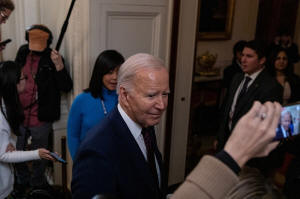Fake 'Biden' robocall tells New Hampshire Democrats to stay home
 Send a link to a friend
Send a link to a friend
 [January 23, 2024]
By Steve Holland [January 23, 2024]
By Steve Holland
MANCHESTER, New Hampshire (Reuters) -As New Hampshire voters prepared to
cast their votes in the state's first-in-the nation primary Tuesday, a
robocall is circulating in the state urging Democrats to stay home -
using a fake audio of U.S. President Joe Biden.
"It's important that you save your vote for the November
election….voting this Tuesday only enables the Republicans in their
quest to elect Donald Trump again," the call says.
The White House confirmed Monday that the call was not recorded by Biden
and said the incident highlights the challenges emerging technologies
present, especially ahead of the November presidential election.
"The president has been clear that there are risks associated with deep
fakes. Fake images and misinformation can be exacerbated by emerging
technologies," White House press secretary Karine Jean-Pierre told
reporters in Washington.
The New Hampshire attorney general, John Formella, announced he is
investigating what he called an apparent "unlawful attempt to disrupt
the New Hampshire Presidential Primary Election and to suppress New
Hampshire voters."
The audio of the call was provided to Reuters by supporters of a
campaign to encourage voters to write in Biden's name on their ballots.
Biden's campaign manager Julie Chavez Rodriguez said the call was
"disinformation" and an attempt to suppress voting.
Support for Biden's write-in campaign will be closely watched amid weak
polls for the president, although the results have no bearing on the
Democratic Party's nominating contest.

The call was first reported by NBC News.
Biden's name is not on the ballot Tuesday, because the national
Democratic Party made South Carolina their first official primary,
ending New Hampshire's historical status and angering some Democrats
there.
In the audio, the Biden "voice" is heard using one of his signature
phrases, "What a bunch of malarkey."
[to top of second column]
|

U.S. President Joe Biden speaks to the media following a gathering
with mayors attending the U.S. Conference of Mayors' annual winter
meeting, in the East Room at the White House in Washington, U.S.,
January 19, 2024. REUTERS/Anna Rose Layden

The calls included the personal cell phone number of Kathy Sullivan,
a former New Hampshire ballot law commissioner and New Hampshire
Democratic Party chair.
Sullivan called the robocall an attempt at election interference and
requested an investigation. It was not clear how widely the audio
call was circulated.
In a statement, Sullivan said she was made aware of it on Sunday
night.
"Multiple people have described receiving a phony voice message
created through AI that mimics the voice of President Biden, in an
attempt to suppress their participation in the upcoming New
Hampshire primary," she said.
She said the call links back to her personal cell phone number
without her permission.
The explosion of generative AI - which can create text, photos and
videos in response to open-ended prompts - in recent months has
spurred both excitement about its potential as well as fears it
could make some jobs obsolete, upend elections and even possibly
overpower humans.
The campaign for former President Donald Trump said it was
"absolutely not" involved in the robocall.
The campaign for Democrat Dean Phillips, a Minnesota congressman who
is running for the Democratic presidential nomination, said it was
not involved.
The Phillips campaign said it found out about the call from a
reporter on Sunday night.
"Any effort to discourage voters is disgraceful and an unacceptable
affront to democracy. The potential use of AI to manipulate voters
is deeply disturbing," the Phillips campaign said.
(Reporting by Steve Holland; Additional reporting by Trevor
Hunnicutt in Washington; Editing by Heather Timmons, Alistair Bell
and Lisa Shumaker)
[© 2024 Thomson Reuters. All rights reserved.]This material
may not be published, broadcast, rewritten or redistributed.
Thompson Reuters is solely responsible for this content. |